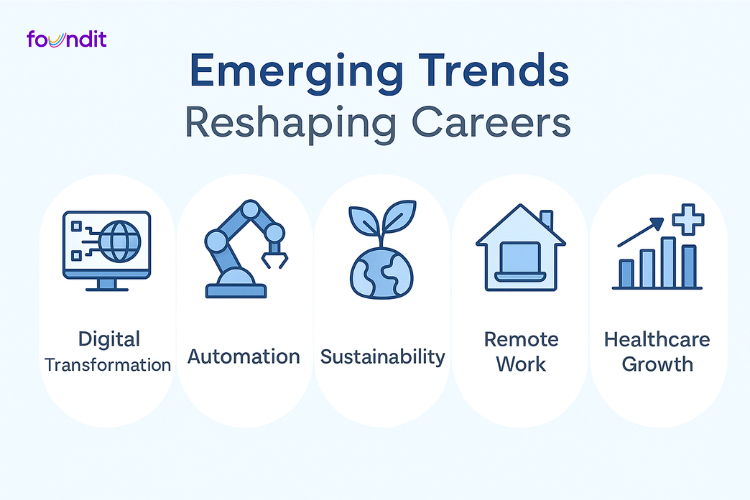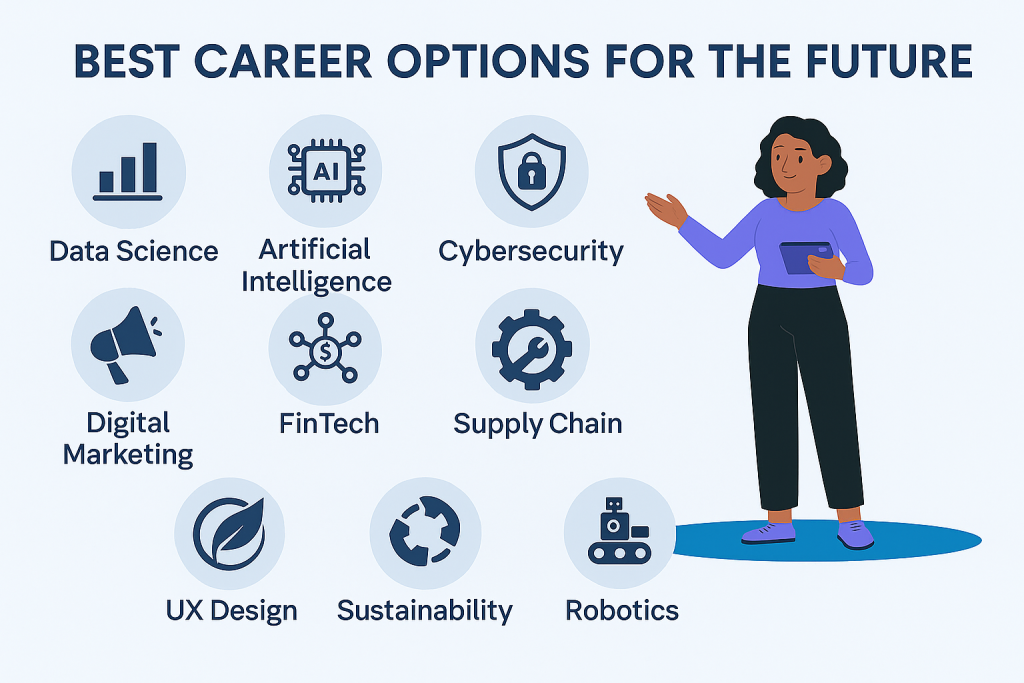The world of work is changing fast. If you’re feeling unsure about what to do next, you’re not alone. This guide can help you take a step in the right direction—towards a career that lasts, grows with you, and makes you feel good about the work you do.
Table of Contents
- Emerging Job Trends
- Top 10 Career Options for Future
- Data Science and Analytics
- Artificial Intelligence and Machine Learning
- Cybersecurity Professionals
- Sustainability and Renewable Energy Experts
- Healthcare and Biotechnology Specialists
- Digital Marketing and Content Creation
- Robotics and Automation Engineers
- E-commerce and Supply Chain Managers
- Financial Technology (FinTech) Professionals
- User Experience (UX) Designers
- Key Skills You’ll Actually Need
- How to Choose a Career You Won’t Regret
- Wrapping Up and What’s Next?
- Frequently Asked Questions (FAQs)
Emerging Job Trends in 2025
The way we work is changing—and not just in tech. Across industries, we’re seeing a shift in what employers look for, what roles are growing, and which ones might fade out. Understanding the bigger picture helps you make smarter career moves. Here are a few key shifts that are reshaping the future job market and what they mean for you.

1. Digital Transformation is Everywhere
From retail to agriculture, digital tools are becoming part of everyday operations. Jobs that require tech literacy—like data analysis, automation, and cloud management—are no longer limited to IT companies. If you’re comfortable working with digital platforms, you’ll be in demand across industries. This also means traditional jobs are evolving, with digital skills becoming a basic expectation.
2. Automation Will Replace Tasks—Not Jobs (Yet)
Automation and AI aren’t just buzzwords—they’re already streamlining repetitive tasks in industries like manufacturing, logistics, and even banking. But instead of eliminating jobs, they’re changing what those jobs look like. This creates space for roles in managing, programming, and improving those systems—roles that blend tech knowledge with strategic thinking.
3. Sustainability is More Than a Buzzword
With climate change and resource scarcity on the radar, businesses are prioritizing green operations. That means careers in renewable energy, sustainable design, and environmental science are growing fast. Even roles in supply chain, product development, and urban planning are now expected to factor in sustainability goals.
4. Remote Work is Reshaping Skill Demand
Remote and hybrid jobs are no longer exceptions—they’re part of the new normal. This has increased demand for self-driven professionals who can communicate well, manage their time, and work across time zones. Jobs that rely on collaboration and digital communication—like project management, design, and marketing—are seeing new growth patterns.
5. Healthcare and Wellness Are Expanding
The healthcare industry isn’t just about doctors and nurses anymore. There’s a growing need for public health experts, mental health professionals, biotech researchers, and telemedicine specialists. The aging population and global health challenges fuel long-term growth in healthcare careers—many of which didn’t exist a decade ago.
Staying ahead means understanding not just where the world is headed, but how your skills fit into it. In the next section, we’ll look at the top 10 future career options that align with these trends—and why they’re worth paying attention to.
Top 10 Career Options for the Future
These aren’t just trending jobs—they’re roles that are evolving with technology, demand, and global shifts. Whether you’re aiming for something future-proof, high-paying, or just more meaningful, here are the most in-demand careers for the future that tick all the right boxes.

1. Data Science and Analytics
In a world driven by decisions, data is everything. Businesses across every sector—finance, retail, healthcare, even sports—use data to stay ahead. That’s why data science jobs are among the fastest-growing careers right now. If you’re good with numbers, patterns, or problem-solving, this field is wide open.
Roles to explore: Data Scientist, Data Analyst, Business Intelligence Analyst, Machine Learning Analyst
Why it’s future-proof: Companies will always need people who can make sense of their data and turn it into action. With demand only rising, this is one of the best careers for the next 10 years.
Skills that help: Python, SQL, Excel, Tableau, Statistics, Communication
Best for: Logical thinkers, problem solvers, people who like uncovering insights
Read Also: Most frequently-asked Data Science Interview Questions
2. Artificial Intelligence and Machine Learning
AI is not just about building robots—it’s powering smart assistants, improving search results, and helping cars drive themselves. As AI gets smarter, we need more people behind the scenes building algorithms, cleaning data, and teaching machines how to think. If you’re drawn to innovation, this is one of the most exciting future jobs in demand.
Roles to explore: AI Engineer, Machine Learning Specialist, NLP Scientist, AI Product Manager
Why it’s future-proof: From chatbots to medical imaging, AI is now part of every modern system. It’s also one of the highest-paying fields and a key player in the future of work.
Skills that help: Python, TensorFlow, deep learning, mathematics, data engineering
Best for: Curious minds, coders, problem solvers who enjoy working with complex systems
Read Also: How to Build a Successful Career in AI
3. Cybersecurity Professionals
Every time you open an app, make a payment, or send an email—security is at work behind the scenes. As businesses go digital, they’re also becoming more vulnerable to data breaches and cyberattacks. That’s why cybersecurity jobs are in huge demand, and that demand is growing faster than companies can fill roles.
Roles to explore: Cybersecurity Analyst, Ethical Hacker, Security Architect, Incident Responder
Why it’s future-proof: With threats getting more sophisticated, skilled professionals will always be needed to build safer digital systems. It’s also one of the best future jobs if you value impact and job security.
Skills that help: Network security, firewalls, penetration testing, Linux, risk assessment
Best for: Analytical minds, detail-focused professionals, ethical problem-solvers
Read Also: Top 25 Cyber Security Jobs 2025: Skills, Role and Salary
4. Sustainability and Renewable Energy Experts
Climate change is no longer a distant threat—it’s a global challenge shaping how we live, work, and build. That’s why there’s a huge rise in careers in sustainability and green energy jobs. Governments and companies alike are investing in sustainable solutions, making this one of the most meaningful and fastest-growing jobs of the future.
Roles to explore: Environmental Scientist, Solar Energy Engineer, Climate Analyst, Sustainability Consultant
Why it’s future-proof: Sustainability is becoming a core business priority. Roles focused on reducing carbon impact, optimising energy use, or designing green infrastructure will stay relevant for decades.
Skills that help: Environmental science, energy systems, lifecycle analysis, policy understanding, reporting frameworks (like ESG)
Best for: Nature-conscious thinkers, systems planners, people who care about long-term impact
5. Healthcare and Biotechnology Specialists
If the past few years have shown us anything, it’s that healthcare isn’t just essential—it’s evolving fast. New diseases, aging populations, and medical tech are reshaping how we treat and prevent illness. This makes healthcare jobs of the future and biotech careers some of the most secure and impactful roles out there.
Roles to explore: Biomedical Engineer, Genetic Counselor, Health Data Analyst, Biotech Researcher, Public Health Expert
Why it’s future-proof: Demand is rising across diagnostics, genomics, and preventive healthcare. Whether it’s developing new vaccines or improving patient data systems, this field offers high-demand future careers that make a real difference.
Skills that help: Biology, medical informatics, research methods, statistics, communication
Best for: Empathetic problem-solvers, STEM learners, people passionate about human health
Read Also: High-Salary Career Options in Medical
6. Digital Marketing and Content Creation
As more of our lives move online, businesses are in a race to capture attention. That’s where digital marketing comes in—an ever-evolving space combining creativity, analytics, and storytelling. Whether you’re into social media, SEO, or content writing, this is one of the most accessible and creative careers with growth.
Roles to explore: Digital Marketing Specialist, SEO Strategist, Content Creator, Email Marketing Manager, Performance Marketer
Why it’s future-proof: As long as there’s the internet, businesses will need people to help them stand out. These are also some of the few jobs that won’t be replaced by AI—because they rely on human creativity and cultural context.
Skills that help: SEO, content writing, analytics tools (Google Analytics, SEMrush), social media, email automation
Best for: Creatives, storytellers, data-driven thinkers who enjoy wearing multiple hats
7. Robotics and Automation Engineers
From factory floors to home assistants, robots are becoming part of daily life. But it’s not just hardware—automation also powers smart systems in warehouses, agriculture, and medicine. That’s why robotics engineering jobs and automation careers are among the most exciting and high-growth jobs for the future.
Roles to explore: Robotics Engineer, Automation Systems Designer, Mechatronics Engineer, Process Automation Analyst
Why it’s future-proof: The push for efficiency, speed, and cost reduction will continue to drive demand for smart machines. If you enjoy designing systems that solve problems, this is one of the best jobs for engineers in the future.
Skills that help: Mechanical engineering, control systems, robotics platforms (ROS), programming (Python, C++)
Best for: Builders, system thinkers, engineers who love solving real-world problems
8. E-commerce and Supply Chain Managers
With online shopping now the norm, managing logistics and delivery behind the scenes is just as critical as what happens on a website. That’s why the future of e-commerce is deeply tied to smart supply chain management careers. These roles keep the economy moving and make sure customers get what they want—on time.
Roles to explore: E-commerce Manager, Logistics Analyst, Inventory Planner, Supply Chain Strategist
Why it’s future-proof: With growing demand for faster, greener, and more reliable deliveries, this field blends tech, analytics, and operations. It’s one of the most practical and in-demand careers for the future.
Skills that help: Operations planning, logistics software (SAP, Oracle), forecasting, data analysis, vendor management
Best for: Organised minds, planners, people who enjoy making systems run smoothly
9. Financial Technology (FinTech) Professionals
Banking, investing, lending—it’s all going digital. With mobile apps, digital wallets, and AI-driven financial tools on the rise, there’s massive demand for professionals who can bridge finance and technology. That’s why FinTech career opportunities are booming and considered among the most reliable future jobs in finance.
Roles to explore: FinTech Product Manager, Blockchain Analyst, Risk & Compliance Officer, Payment Systems Architect
Why it’s future-proof: As consumer trust shifts to digital-first platforms, FinTech roles are becoming critical to how the economy operates. It’s one of the fastest-evolving sectors with room for tech-savvy financial minds to grow.
Skills that help: Financial modeling, APIs, blockchain basics, regulatory knowledge, cybersecurity awareness
Best for: Analytical professionals, risk evaluators, finance minds with a tech twist
10. User Experience (UX) Designers
In a world full of apps, websites, and platforms, how it feels to use something can be just as important as what it does. That’s why careers in user experience (UX) are gaining serious ground. As businesses fight for attention, smooth and intuitive design is no longer optional—it’s business-critical.
Roles to explore: UX Designer, UI/UX Researcher, Interaction Designer, Accessibility Specialist
Why it’s future-proof: UX roles combine empathy, psychology, and tech. These creative tech careers are some of the few that balance art and analytics—and they continue to grow with every new digital product launched.
Skills that help: Wireframing, Figma, user research, A/B testing, design thinking
Best for: Empathic designers, creative problem-solvers, people who think like users
Key Skills You’ll Actually Need
You’ve seen the jobs—now let’s talk about what it takes to get them. Most future jobs in demand won’t require you to know everything, but they will demand the right mix of future-ready skills. Here’s a breakdown of the top abilities that employers across industries are already looking for—and will continue to prioritise.

1. Digital Literacy
From spreadsheets to automation tools, being comfortable with tech is non-negotiable. You don’t need to code (unless you want to), but you should be confident working with digital platforms, apps, and cloud-based tools.
2. Communication
Whether you’re in tech, design, or finance, your ideas need to land clearly. Employers value those who can write, speak, and present their thoughts well—especially in remote and global teams.
3. Problem Solving
As roles evolve, so do challenges. The ability to think critically, troubleshoot on the go, and find better ways to do things makes you stand out—no matter your industry.
4. Adaptability
Tools, trends, and tasks will change. Being adaptable (and willing to learn) is one of the most underrated but powerful skills for future jobs. If you can handle change, you’ll always be one step ahead.
5. Collaboration
Most future roles won’t be solo. Teams are becoming more cross-functional, meaning you’ll often work with people from different departments—or even different time zones. Being a team player still matters, a lot.
6. Learning Agility
The most successful professionals will be lifelong learners. Whether it’s picking up a new tool, switching domains, or taking a short course, staying curious keeps you future-proof.
You don’t need to be perfect at all of these. But being aware of them—and steadily building them—puts you ahead in the race for tomorrow’s best roles.
So now you know which skills are in demand—but how do your current strengths stack up? Before moving forward, take a moment to reflect. This quick skill check below will help you figure out how future-ready you really are—and which career paths might suit you best.
Read Also: Highest-Paying IT Jobs in 2025: Top 20 [Roles, Salary]
 Quick Skill Check: How Future-Ready Are You?
Quick Skill Check: How Future-Ready Are You?
Select your current skill level for each of the following:
| Skill | Beginner | Intermediate | Advanced |
|---|---|---|---|
| Data Literacy | |||
| Digital Tools (Excel, Figma, CMS) | |||
| Communication Skills | |||
| Problem Solving | |||
| Adaptability |
How to Choose a Career You Won’t Regret
Now that you’ve seen the most in-demand careers for the future, the next step is figuring out what fits you. Picking a career isn’t just about trends—it’s about making choices that align with who you are, what you value, and where you see yourself growing.
1. Reflect on What You Actually Enjoy Doing
Think back to times when you felt focused, motivated, or excited to solve something. Was it solving a tough problem? Designing something cool? Helping someone? These moments are clues to career paths that align with your strengths.
2. Match Your Skills with Market Demand
It’s not just about what you’re good at—it’s also about what people are willing to pay for. Use tools like job boards and career reports to research where your skills match up with growing industries. This is key to making smart career choices.
3. Don’t Be Afraid to Explore
Trying out internships, side projects, or short-term gigs is a great way to test the waters. You don’t need to commit to a path forever—just long enough to learn what works for you. This approach reduces pressure and gives you real-world insight.
4. Think About Lifestyle, Not Just Salary
Chasing the highest salary might work short-term, but over time, work-life balance, purpose, and flexibility often matter more. Ask yourself: Will I enjoy the pace and environment this job brings?
5. Keep Space for Change
Careers are less like ladders and more like highways—with exits, turns, and new directions. As industries shift, your goals might too. That’s okay. The goal isn’t to find a “perfect job,” but to make a good decision for who you are right now.
There’s no one-size-fits-all answer. But using a mix of career planning tips and personal awareness can make your next step feel a lot more intentional—and a lot less random.
Frequently Asked Questions (FAQs)
1. What are the most in-demand careers for the next 10 years?
Fields like data science, AI, cybersecurity, healthcare, renewable energy, and UX design are projected to grow rapidly. These roles offer strong job security and align with global trends in technology and sustainability.
2. How do I choose a career that suits me?
Start by identifying your interests, strengths, and values. Consider taking career assessments and exploring industries that align with your skills and passions. Informational interviews and internships can also provide valuable insights.
3. What skills are essential for future jobs?
Key skills include digital literacy, adaptability, critical thinking, communication, and continuous learning. Employers value both technical proficiency and soft skills that enable collaboration and problem-solving.
4. Can I switch careers later in life?
Absolutely. Many people successfully transition to new careers by leveraging transferable skills and acquiring new qualifications. Lifelong learning and flexibility are crucial in today’s evolving job market.
5. Do I need a college degree for these careers?
Not necessarily. While some roles require formal education, many in-demand careers value skills and experience over degrees. Online courses, certifications, and bootcamps can provide alternative pathways.
6. How can I future-proof my career?
Stay updated with industry trends, continuously develop your skills, and be open to change. Networking and seeking mentorship can also help you adapt and thrive in a dynamic job landscape.
7. What resources can help me plan my career?
Utilise online platforms like LinkedIn, Coursera, and industry-specific forums. Career counselling services and professional associations can also offer guidance and support.
8. How important is work-life balance in choosing a career?
Work-life balance is a significant factor in career satisfaction. Consider roles and organisations that align with your lifestyle preferences and offer flexibility to maintain well-being.




